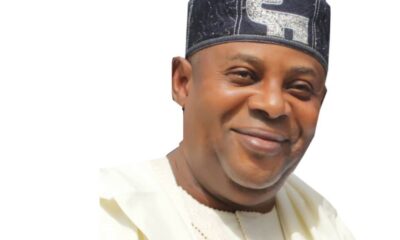Education
Nigeria – a Nation in Need of Accurate Education Statistics
Article by: Peter Oluka


Education data typically involves data compiled from schools on graduation rates, drop-out rates, test score averages, and the most vital – external examination performances.
Often, education data is used to measure the success of a State, Region, Institutions or Individuals and benchmark them against others to improve your own work, products, or processes.
Nowadays, most States publish annual report ‘detailing’ education data meant to hold schools accountable, but why are the students’ success rates at examinations not improving?
It simply means there’s a problem. The information presented in most of these annual reports or scorecards are not always reliable. And the fault lies in the way the data is sourced, compiled and presented.
What exactly goes wrong? How does data become inaccurate? And where can students, parents, schools, researchers, businesses and the government get accurate data about schools’ performances with regards to learning and examinations in Nigeria?
Missing Data
I can boldly say that the ‘missing data’ is at the ‘vault’ of the 71-year-old West African Examinations Council (WAEC) established in 1952 to be a world-class examining body, adding value to the educational goals of its stakeholders. How?
Yes, many reports churn out of researches or academic exercises lack sufficient and accurate data. In many cases, data was not available on demographics like gender, ethnicity, income level, or disabilities. On top of that, most reports can point to the exact key performance indicators.
Takeaway > Many challenges in the educational sector will remain unsolved without access to accurate data. Data!
Let’s break it down: Increase in infrastructural decay, limited resources including personnel, and/or adequate funding in the education sector are traceable to lack of accurate, adequate and real-time access to data for planning and decision-making.
The UN recently released a damning report that only 15 percent of Nigerians have access to electricity, while UNESCO states that only 24 percent receive secondary education or higher.
What statistics like these throw to our faces are the reasons an overwhelming number of Nigerian children lack access a basic education, even in a 21st Century world.
Therefore, a data-driven approach can help address problems such as the lack of infrastructure by using local statistics to identify areas where progress can be made.
For corporate organisations, sometimes it takes just one individual to come up with an innovative new approach that gives your organisation the competitive edge, but more often than not, it requires the collaboration of various different teams and the combination of lots of different data sources.
In today’s fast-paced and artificial intelligence (AI) driven world, most executives agree data-driven operations across lines of business is key to a winning strategy.
Illustrating that point is the 85% increased investment in digital capabilities and 77% increased investment in IT, as reported in the 2022 Gartner CEO and Senior Business Executive Survey. Giving your employees the ability to access and make sense of their data, whether they sit within technical teams or not, is therefore crucial to your success.
Your data needs to be democratised across the business, although this is often harder than it would seem.
According to New Vantage Partners’ Data and AI Leadership Executive Survey 2022, only 27% of organisations have managed to nail this, with another 19% struggling to establish a data culture.
Through 2025, 80% of organisations seeking to scale digital business will fail because they don’t take a modern approach to data and analytics governance, as stated by Gartner’s State of Data and Analytics Governance.
Unfortunately, modernising tech stacks and migrating to the cloud are not enough to put the right data in the right hands of everyone across the business. Organisations must modernise their governance practices to fully uphold their efforts.
For instance, if an Education Technology (EdTech) startup can find out why there aren’t enough schools in a certain area, they can use census data to determine how many students live there.
Upon completion of that phase, they move further to collaborate with government officials to work out what must be done — maybe constructing more schools or finding ways to transport students who currently walk long distances to school each day.
How about researchers? It is a no-brainer that ‘poor quality data can have serious effects on later analysis. Data containing errors of commission or omission have the potential of throwing off analytical calculations, which may then lead to incorrect conclusions’.
Real-Time Access to Data is the Solution
The best way to describe this is to see education data as an apparatus that receives and uses inputs to help run the educational process, producing outputs that tangible and/or measurable. Data use deepens critical thinking and decision-making by parents, teachers, students, educational institutions, researchers, donor agencies/NGOs, businesses and the government.
Thus, collecting and analyzing data to determine why children are out of school will allow you to take actionable steps to reduce these numbers. For example, if you find that many young girls drop out after their first menstruation cycle (usually around age 12 or 13), you can focus resources on providing private sanitation facilities for girls at their schools.
This will help eliminate hygiene-related reasons for young girls dropping out of school and ensure they stay engaged with education.
By collecting data about why children aren’t enrolled in school, it is possible to make informed decisions about how best to address your target population’s needs.
You can also use data to measure how effective interventions have been in reducing dropout rates. This information can be used by decision-makers to create programs tailored specifically for your region and local culture.
In addition to focusing on specific groups based on location and demographics, you can collect data from each student who has dropped out of school.
So, innovative solutions informed by high-quality data and evidence can help improve school performance and keep children in school, especially those who are most at risk of dropping out.
Currently, 1 in 6 Nigerian students is not enrolled or attends irregularly, but with proper attention to data, concerned stakeholder can make sure that not one more Nigerian child has to grow up without an education. This will require political will, effective planning, and coordination between federal and state government officials as well as local communities.
Well, there is light at the end of the tunnel, as the West African Examinations Council (WAEC), is taking the bull by the horn through the introduction of an artificial intelligence-driven Education Statistics (EduStat) platform. Find out about more about the potentials of EduStat in my next piece…
About the writer:
*Peter Oluka is the Editor of TechEconomy, a Lagos-based media startup. You can follow Peter on Twitter @PeterOlukai.
Education
South East Educators Conference (SEEC) 2025 Set to Transform the Future of Education in Nigeria
“…SEEC 2025 will equip every stakeholder to not only adapt to change—but to drive it,” says Barr. Doris Chinedu-Okoro.


A new wave of educational transformation is coming! The highly anticipated South East Educators Conference (SEEC) 2025 is set to take place from May 2nd to 3rd, 2025 at the prestigious Nike Lake Resort, Enugu, under the powerful theme: “Advancing Education: Innovation, Leadership & Transformation.”
Barr. Doris Chinedu-Okoro, Convener of SEEC, said this year’s edition promises to be the most impactful yet, gathering a dynamic blend of visionaries, thought leaders, innovators, educators, and policymakers to drive conversations, collaborations, and commitments that will shape the future of education in Nigeria and beyond.
Keynote Speakers
The Convener said the keynote speakers include; His Excellency, Senator Liyel Imoke – former Governor of Cross River State and Founder, the Bridge Leadership Foundation and a statesman passionate about youth development and sustainable leadership, is among the pious keynote speakers.
Also, “Mr. Paul Onwuanibe – CEO, Landmark Group – a trailblazing entrepreneur whose insight into innovation and infrastructure development will challenge educational stakeholders to think big and build boldly”.
Other Speakers include;
Rotimi Eyitayo – CEO, Teammasters & Education Business School, Chinoso Ogbogu – Co-Founder, Sabi Writers, Rhoda Odigboh – Education Thought Leader & Regional Director Kizazi, Dr. Joy Isa – President Isa School Of Education & Educational Strategist, Fisayo Oludipe – Education Consultant & Leadership Coach, and Susan Charles – Learning Innovator, Moyo Lifematics – Mathematics Educator & Content Creator, Eben Odetola Israel – EdTech Advocate, Mr. Ogunsola – STEM Educator, and Yinka Ogunde – CEO, Edumark Consult. “…and many more voices of influence across Africa’s educational and leadership landscape!”
Highlights to Look Forward to:
“Gala Night – A celebration of brilliance, impact, and community; Movie Night – A night of reflection and bonding through storytelling; Educator Awards – Honoring those who go beyond the call of duty to inspire change; Breakout Sessions & Masterclasses – Practical, hands-on learning experiences, and Exhibitions & EdTech Showcases – Featuring tools, innovations, and solutions for the future-ready educator.
“SEEC 2025 is not just a conference. It is a movement—a call to action for educators, school owners, government stakeholders, parents, and youth advocates to come together and reimagine the future of learning, teaching, and leadership in Africa.
“We believe education is the engine of national development. SEEC 2025 will equip every stakeholder to not only adapt to change—but to drive it,” says Barr. Doris Chinedu-Okoro, added.
To participate at SEEC2025, register via the link and secure your slot. www.southeasteducatorsconference.com.
Follow the conversation online using #SEEC2025 and tag us @southeasteducationconference on all platforms. For sponsorship, media partnerships, or exhibition opportunities, contact us at [email protected]
Education
Enugu Govt to Boost Infrastructure at Nigerian Law School


… As Mbah canvasses higher admission quota for ESUT Law Faculty
The Governor of Enugu State, Dr. Peter Mbah, says the state government will soon commence the construction of an ultramodern auditorium for the Augustine Nnamani campus of the Nigerian Law School at Agbani in Enugu State, stressing his administration’s readiness to support the campus to excel as a citadel of legal education in Nigeria.
Mbah made this known when he received a team of the Council of Legal Education at the Government House, Enugu, on Monday commending the Council for its work in guiding and nurturing teaching and learning in the Law School.
The governor, who was represented by the Deputy Governor, Barr. Ifeanyi Ossai, equally canvassed for an increase in the admission quota of the Faculty of Law, Enugu State University of Science and Technology, ESUT, to create more opportunities for the increasing population of the state’s indigenes and residents wishing to study Law.
“Quite frankly, the expansion in the number of campuses of the Law School makes their management and coordination more challenging, but that is inevitable because of the increasing number of our brothers and sisters, who seek to become lawyers.
“I want to assure you that with respect to the commitment of our government and our state to enhance the facilities at that Law School, Agbani, the date for the groundbreaking ceremony for the auditorium will be communicated to you sooner than you would imagine.
“This is also an opportunity to request that you consider increasing the admission quota of the ESUT Faulty of Law because of the teeming number of our people that want to study law. On our part, we are determined to put all necessary infrastructure and human capital in place to make it one of the best Law faculties in the entire country because in Enugu, we prioritise education,” the governor stated.
Speaking, the Chairman of the Council of Legal Education, Chief Emeka Ngige, SAN, commended the Governor Mbah Administration for its commitment to the development of legal education in the country.
“Sometime ago, the governor hosted a delegation of the management saff of the Augustine Nnamani campus of the Law School here at the Government House. On that occasion, the governor sought to know the urgent needs of the Campus at Agbani. Upon hearing the request, he, on behalf of Enugu State Government, offered to build an ultramodern auditorium for the Nigerian Law School at Agbani.
“In addition to that, he also offered to appeal to Pinnacle Oil and Gas to build a Moot Court for the Augustine Nnamani Campus as part of his infrastructural support to the institution.
“So, we made it a point that before we set out to other places, including a visit to other law faculties that require accreditation, our first port of call would be to come to the Government House to pay our respect to the government and people of Enugu State to say thank you for the offer the state government has made,” Ngige said.
Education
VDL International Conference Highlights Fostering Ethical Values in the Society


Stakeholders at the Values for Daily Living International [VDLI] inaugural annual conference have recommitted to continuing efforts in promoting ethical values and moral principles, inspiring positive change in individuals and communities worldwide.
The VDLI inaugural annual conference convened by Sandra Ani, was a resounding success, bringing together students, parents, scholars, educators, and community members to engage in meaningful discussions and celebrate achievements in value-based education.
The conference, held at the at The Parliament Hall, Post Primary School Management Board, Enugu State, attracted more than 1000 participants from various sectors, including education, business, healthcare, and government online and on-site.
The theme, “Take It Back: Building Today for a Greater Tomorrow” resonated deeply with attendees and speakers alike.


Prof. Peter Ndubueze Mbah (Ph.D.), the Hon. Commissioner of Education, Enugu State, in his keynote address emphasized the importance of integrating core values into every aspect of life, from personal interactions to professional endeavors.
He highlighted the need for a collective effort in nurturing a society grounded in respect, empathy, and honesty.
Throughout the conference, participants engaged in a series of interactive workshops, panel discussions, and networking sessions.
During the panel session, discussants reiterated the role of the church, school, and home in restoring values to society was a key topic of the panel discussions.
This interactive session provided deep insights into shared responsibilities in moral value restoration.
These narratives provided a powerful reminder of the impact that integrity and compassion can have on society.
Feedback from attendees was overwhelmingly positive, with many expressing a renewed commitment to fostering values in their personal and professional lives. “This conference has reignited my passion for ethical leadership and community service,” said one participant. “I leave here today inspired and ready to make a difference.”
Sandra Ani, the convener, in her address expressed gratitude to all participants, speakers, and sponsors for their contributions to the success of the conference. “Together, we have taken a significant step towards building a more compassionate and ethical society. I am confident that the conversations and connections made here will continue to inspire positive change in our communities.”
The event served as a platform for open dialogue and interactive learning, fostering a sense of shared responsibility in nurturing moral values within the community.
Other notable speakers included Hon. Chibueze Ofobuike, the chairman of Aguata Local Government Area of Anambra State; Barr. Doris Chinedu-Okoro, CEO of Evergreen Group; and Mr. David Folaranmi, an advocate of drug abuse and addiction recovery.
Essay Competition
Highpoint of the conference includes an essay contest which focused on senior secondary school students from both government and private schools on the topic: “What are the common reasons why teenagers might be tempted to experiment with drugs, and what strategies can they employ to resist peer pressure and make healthy choices regarding substance use?”
The contest attracted over 500 entries, which were narrowed down to 100 students for the second stage, and finally, 20 students made it to the finals.
During the conference, the top 20 essay writers were invited to receive an award of excellence. The top three essay winners were each given an award plaque, a gold medal, a certificate of excellence, and a cheque of 200,000 NGN for the second runner-up, 300,000 NGN for the first runner-up, and 500,000 NGN for the overall winner.
These students came from Anambra State, Osun State, and FCT Abuja, respectively. The remaining 17 students, representing Benue State, Kwara State, Ireland, Ebonyi State, and Enugu State, were awarded a gold medal and a certificate of excellence each.
Brand Ambassadors
All top 20 essay contest finalists were appointed as brand ambassadors of VDLI. Their faces will appear on billboards in five states of the country. As ambassadors, they are expected to uphold and promote the moral values advocated by VDLI in their various environments.
Awards and Recognitions
All speakers were presented with recognition awards from the organization. The Hon. Commissioner of Education received an award for his profound impact on enhancing education; Hon. Chibueze Ofobuike was recognized for empowering youths and transforming communities; Barr. Doris Chinedu-Okoro received an award for her outstanding contribution towards advancing education; and Mr. David Folaranmi was acknowledged for his efforts in creating awareness on drug abuse and helping people overcome addiction.
Special Presentations
A notable presentation on the role of the girl child in upholding Nigeria’s values and ethics was made by Akpem Comfort Msuurshima from Jewel Model Schools, Makurdi, Benue State.
Additionally, a cultural display by students of Seat of Wisdom Secondary School, Enugu, showcased the rich cultural heritage of Nigeria.


About Values for Daily Living International Conference:
Values for Daily Living International (VDLI) is an organization dedicated to the global promotion of ethical values and moral principles. Founded in 2019, VDLI has been at the forefront of inspiring positive change in individuals of all ages. Through innovative programs, impactful initiatives, and engaging resources, VDLI strives to encourage individuals to lead more fulfilling lives, guided by morals such as honesty, integrity, and respect.
The mission is to use the teaching of values to change minds, thereby transforming lives.
VDLI’s vision is to cultivate a society deeply rooted in strong moral values, ensuring individuals contribute meaningfully to society.
The Organization emphasizes values such as Integrity, Leadership, Compassion, and Respect guide all aspects of VDLI’s work, from program development to community engagement.












